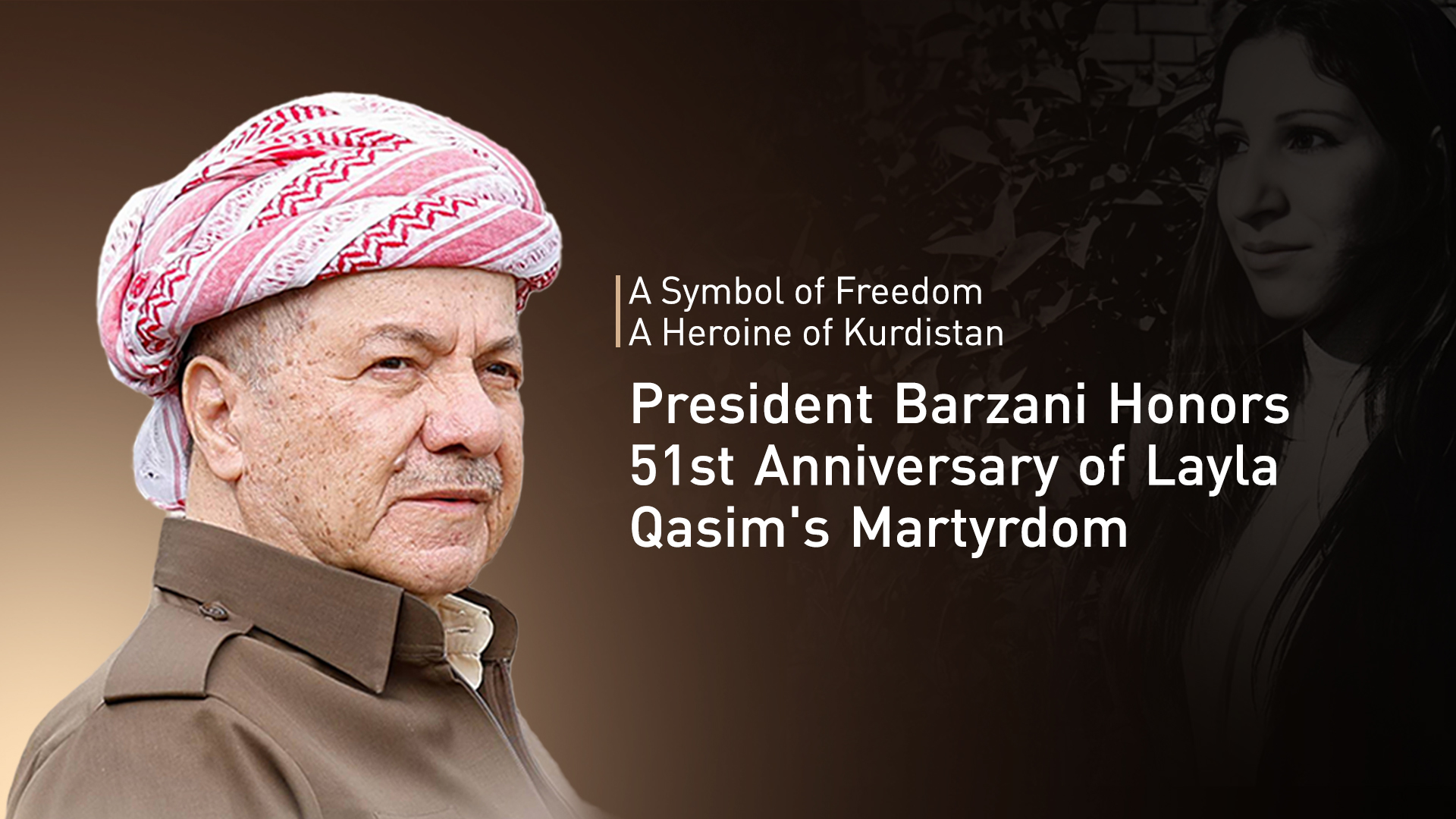President Barzani Honors Layla Qasim on 51st Anniversary of Execution: 'A Symbol of Defiance and Kurdish Freedom'
"She stood up to oppressors and turned her back on life, becoming a martyr rather than accepting subjugation," President Barzani stated.

By Kamaran Aziz
ERBIL (Kurdistan24) — On the fifty-first anniversary of the execution of Kurdish nationalist Layla Qasim and her comrades, President Masoud Barzani published a poignant tribute on his official 'X' (formerly Twitter) account, hailing her as a timeless symbol of Kurdish resistance and a beacon of female heroism in the face of tyranny.
“Layla Qasim is an example of the heroism of Kurdish women and a symbol of the Kurdish people's quest for freedom,” President Barzani wrote in his message on Monday. “She stood up to oppressors and turned her back on life, becoming a martyr rather than accepting subjugation. On the fifty-first anniversary of the execution and martyrdom of Layla Qasim and her comrades, we send thousands of salutations to their pure souls and to the souls of all martyrs of the path to freedom.”
Layla Qasim, executed by the Ba'athist regime on May 12, 1974, at the age of 22, has long held a revered place in Kurdish collective memory.
Born in 1952 in Kurdish town of Khanaqin, in Diyala province, she was exposed from an early age to Kurdish patriotism and political activism. As a sociology student at the University of Baghdad, she became active in the Kurdistan Democratic Party (KDP)'s Students’ Union and quickly emerged as one of the most courageous female figures in the Kurdish freedom movement.
Qasim worked underground to mobilize young Kurdish revolutionaries, staunchly advocating for the political and cultural rights of Kurds, which had been systematically eroded under successive Iraqi regimes.
Prior to the collapse of the Kurdish Aylul (September) Revolution in 1975—triggered by the Algiers Agreement between Iraq and Iran—the Ba'athist regime launched a brutal campaign against political activists and KDP members. Qasim and her four male comrades— Jawad Hamwandi, Nariman Fuad Masti, Hassan Hama Rashid, and Azad Sleman Miran — were arrested, tortured, and imprisoned in the notorious Abu Ghraib facility.
They were sentenced to death on fabricated charges of "sabotage and terrorism," a common tactic used by the regime to eliminate political dissent. On May 12, 1974, they were hanged in a public execution meant to instill fear. Instead, their deaths sparked outrage and further galvanized the Kurdish nationalist cause.
According to President Barzani, who wrote about her sacrifice in his book Staking Our Claim, “In 1974, the [former Iraqi] government ignored the region’s autonomy and launched a campaign against the KDP officials in Baghdad, which led to the death of Layla Qasim, who was the first Kurdish woman to be hanged to death by Iraqi government due to her political activities on May 12, 1974.”
In her final hours, Qasim reportedly made a last request to her mother—to be allowed to wear traditional Kurdish clothes for her execution, so she might die as the symbolic “bride of Kurdistan.”
President Barzani’s tribute reaffirms Qasim’s enduring status not only as a martyr but as an emblem of courage within the Kurdish liberation movement. Her defiance in the face of death and her refusal to recant her beliefs have inspired generations of Kurdish youth, particularly women, who continue to see her as a role model in the ongoing struggle for justice and autonomy.
This poem by the famed Kurdish poet, Hemin Mukriyani on Layla Qasim's Heroism, serves as a poignant reminder:
In the silence of night, you vanished from sight,
My moon pales 'neath the shadow of your hair's delight.
Majnun, heed not your Leila's fleeting fame,
For mine burns bright with a timeless flame.
She mocked, "You, the executioner, blind to see!"
Yet, his scorn is but a badge, not my decree.
For in the annals of valor, I etch my claim,
A hero born of love for my nation's name.
Today, monuments, schools, and cultural centers bearing her name are scattered across the Kurdistan Region, and her legacy is commemorated annually by both the public and political leadership. Her story has become inseparable from the Kurdish national narrative—one marked by perseverance, resistance, and sacrifice.
